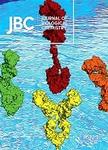版权所有:内蒙古大学图书馆 技术提供:维普资讯• 智图
内蒙古自治区呼和浩特市赛罕区大学西街235号 邮编: 010021

作者机构:Univ Dundee Inst Med Sci Dept Biochem Canc Res CampaignCell Transformat Grp Dundee DD1 4HN Scotland
出 版 物:《JOURNAL OF BIOLOGICAL CHEMISTRY》 (生物化学杂志)
年 卷 期:1999年第274卷第39期
页 面:28042-28049页
核心收录:
学科分类:0710[理学-生物学] 071010[理学-生物化学与分子生物学] 07[理学]
主 题:DNA/遗传学 表位/遗传学 大肠杆菌 进化 分子 基因 p53 遗传学技术 热温度 蛋白质生物合成 蛋白质构象 蛋白质变性 网状细胞/代谢 热力学 转录 遗传 肿瘤抑制蛋白质p53/化学 肿瘤抑制蛋白质p53/遗传学 动物 人类 兔
摘 要:Conformational stability of the p53 protein is an absolute necessity for its physiological function as a tumor suppressor. Recent in vitro studies have shown that wild-type p53 is a highly temperature-sensitive protein at the structural and functional levels. Upon heat treatment at 37 degrees C, p53 loses its wild-type (PAb1620(+)) conformation and its ability to bind DNA, but can be stabilized by different classes of ligands. To further investigate the thermal instability of p53, we isolated p53 mutants resistant to heat denaturation. For this purpose, we applied a recently developed random mutagenesis technique called DNA shuffling and screened for p53 variants that could retain reactivity to the native conformation-specific anti-p53 antibody PAb1620 upon thermal treatment. After three rounds of mutagenesis and screening, mutants were isolated with the desired phenotype. The isolated mutants were translated in vitro in either Escherichia coli or rabbit reticulocyte lysate and characterized biochemically. Mutational analysis identified 20 amino acid residues in the core domain of p53 (amino acids 101-120) responsible for the thermostable phenotype. Furthermore, the thermostable mutants could partially protect the PAb1620(+) conformation of tumor-derived p53 mutants from thermal unfolding, providing a novel approach for restoration of wild-type structure and possibly function to a subset of p53 mutants in tumor cells.